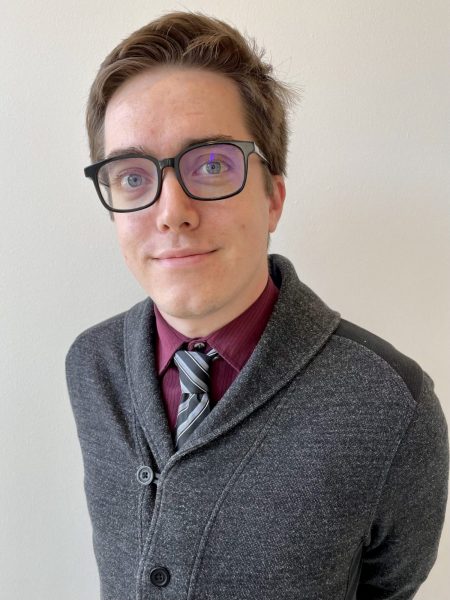 James Kruse knew he wanted to pursue a forensics career while he was still in high school. Armed with that knowledge and desire, he examined each of his college visits through the lens of which university could best help him achieve his dreams.
James Kruse knew he wanted to pursue a forensics career while he was still in high school. Armed with that knowledge and desire, he examined each of his college visits through the lens of which university could best help him achieve his dreams.
He chose Iowa State University.
“Out of the six schools I visited, Iowa State was the one that said, ‘Yes, not only can you pursue a career in forensics, but here’s how,’” Kruse said.
While Iowa State doesn’t offer a forensics major, Kruse (’18 biology, interdisciplinary studies – diploma of medical jurisprudence; ’20 MS interdisciplinary graduate studies) worked with his advisors to pave an academic path toward a forensics career. He majored in biology to gain knowledge in areas such as human anatomy, physiology, and genetics. His advisor also suggested Kruse pair his science degree with criminal justice. Iowa State now has a criminal justice major, but at the time, Kruse built his own interdisciplinary studies program with the help of numerous LAS faculty members.
“That really spawned my deep belief in interdisciplinary education,” Kruse said.
Research with purpose
Kruse took his classroom education a step further when he interned with the Center for Statistics and Application in Forensic Evidence (CSAFE), a research center at Iowa State committed to applying proven statistical and scientific methods to improve the accuracy of the analysis and interpretation of forensic evidence. The internship turned into an undergraduate research assistantship and then a graduate assistantship. He also participated in a partial assistantship with Department of Sociology and Criminal Justice.
At CSAFE, Kruse helped create data collection methods for a longitudinal shoe study. He and the CSAFE team studied how the soles of certain brands of tennis shoes broke down over time. Anonymous volunteers on campus wore the shoes and brought them to the CSAFE lab every six weeks. Kruse and a team of undergraduate researchers implemented various data collection methods on the soles of those shoes, including digital and 3D scans.
“The whole idea was we wanted to build this huge database and watch how these shoes broke down over time,” Kruse said. “The statisticians were developing algorithms and tools that can be used by practitioners to come up with statistical backing for their final findings.”
Dream realized
At the end of his CSAFE graduate assistantship in 2020, Kruse earned an interdisciplinary master’s degree that involved biomedical science, genetics, genomics, and sociology. The strategy of creating his own academic path paid off when he landed a job as a medicolegal death investigator with the Iowa Office of the State Medical Examiner in Ankeny.
As a state death investigator for the past two years, Kruse is responsible for investigating the circumstances of natural or suspicious deaths that occur outside the care of a physician, hospital, or clinic. Those types of deaths become the jurisdiction of the county medical examiners where the death took place, but are transferred to the state medical examiner if an autopsy is needed.
That’s when Kruse steps in and reviews the county medical examiner’s documentation, reads the police and paramedic reports, analyzes scene photos, and talks with the deceased’s next of kin. Kruse then provides this information to the autopsy doctor, who determines the final cause and manner of death. This must happen prior to the scheduled autopsy. Kruse also acts as a county death investigator for Story County when necessary.
“No matter what, you never know what a day will bring,” Kruse said. “You learn as you go how to balance the job and make sure that every agency gets what they need, and every family is taken care of to the best of your ability.”
Thank you, Iowa State
Kruse credits the interdisciplinary approach to his Iowa State degrees and the experience he gained with CSAFE for allowing him to excel in his forensics career.
“The education that I was able to get in criminal justice and understanding that system as well as biology – really being able to understand the autopsy results given to me by the doctors – having that background makes it so I can understand what they are telling me,” he said. “CSAFE taught me how to break things down and what to focus on when I’m designing a study to make sure you look at all the tiny details. That’s been hugely helpful.”
Kruse’s advice to current students interested in a forensics career is to ask questions and seek out faculty who can help you achieve your goals, just as he did.
“After talking with tons of professors, I was able to build my own path to a forensics career,” Kruse said. “For instance, my organic chemistry professor helped me get my first tour at a crime lab, and Dr. Matt DeLisi helped me build this master’s degree that I now use every day. Don’t be afraid to talk with professors and professionals and take as many opportunities as you can.”
